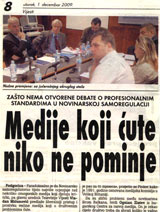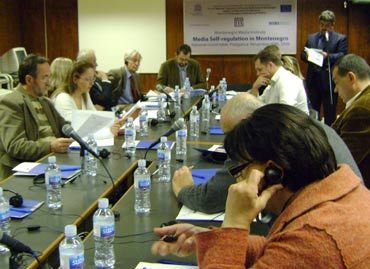Media legislation discussed at roundtable in Montenegro
22-12-2009 (Podgorica)

Article about the roundtable in
the Montenegrin daily Vijesti.
© Vijesti
The current situation and the future of media self-regulation in Montenegro, as well as issues related to media legislation in the country, were the main topics discussed on 30 November in Podgorica during a national roundtable organized by UNESCO.
The event, prepared in collaboration with the Montenegro Media Institute and OSCE, gathered 30 participants: journalists, representatives of self-regulatory bodies and independent experts.
Speakers included Professor Robert Pinker, from the United Kingdom Press Complaint Commission; Mirsad Rastoder, Head of the Council of Journalists’ Self-Regulatory Body; Vladan Mićunović, Editor-in-chief of TV Vijesti; and Ognian Zlatev, UNESCO consultant and Director of the Media Development Center in Sofia (Bulgaria).
Pinker pointed out that all European countries must face self-regulation in order to be aligned with the European Union standards. Although each country has its own political traditions and acts differently, there are some common problems, like privacy violation or publishing incorrect and unverified information, that all of them have to come to terms with.
Mirsad Rastoder reminded that in 2002 Montenegrin media professionals, organizations and associations signed the local Code of Ethics. Hate speech has been significantly diminished in the country’s media since them. According to him, the major problem for the media now is the decision on a defamation law.
Vladan Mićunović stressed that Montenegrin media lack a straight professional debate. The roundtable participants agreed that self-regulation could reduce the external pressure on the media. They concluded that media self-regulation could also help avoid trials.
Ognian Zlatev stated that self-regulation is a continuous process and the media should act in accordance with it, on the way to the civil democratisation. A better quality of the media work can be achieved by establishing the standards contained in the Code of Ethics; that way media could be protected from the influence of the powerful ruling structure. Zlatev also explained that there is no universal model of self-regulation, while the principles that are at the base of self-regulation are universal.
The event was part of a series of national roundtables organized by UNESCO in the framework of its project, Alignment to International Standards in the Media Sector of South-East European Countries. The targeted countries are Albania, Bosnia and Herzegovina, Croatia, the former Yugoslav Republic of Macedonia, Montenegro, Serbia, Turkey and Kosovo (under UNSCR 1244). The national roundtables aim to initiate the process of establishing a self-regulatory mechanism and/or newsroom ombudsman mechanisms in each targeted country. The whole project is financed by the European Union.
Speakers included Professor Robert Pinker, from the United Kingdom Press Complaint Commission; Mirsad Rastoder, Head of the Council of Journalists’ Self-Regulatory Body; Vladan Mićunović, Editor-in-chief of TV Vijesti; and Ognian Zlatev, UNESCO consultant and Director of the Media Development Center in Sofia (Bulgaria).
Pinker pointed out that all European countries must face self-regulation in order to be aligned with the European Union standards. Although each country has its own political traditions and acts differently, there are some common problems, like privacy violation or publishing incorrect and unverified information, that all of them have to come to terms with.
Mirsad Rastoder reminded that in 2002 Montenegrin media professionals, organizations and associations signed the local Code of Ethics. Hate speech has been significantly diminished in the country’s media since them. According to him, the major problem for the media now is the decision on a defamation law.
Vladan Mićunović stressed that Montenegrin media lack a straight professional debate. The roundtable participants agreed that self-regulation could reduce the external pressure on the media. They concluded that media self-regulation could also help avoid trials.
Ognian Zlatev stated that self-regulation is a continuous process and the media should act in accordance with it, on the way to the civil democratisation. A better quality of the media work can be achieved by establishing the standards contained in the Code of Ethics; that way media could be protected from the influence of the powerful ruling structure. Zlatev also explained that there is no universal model of self-regulation, while the principles that are at the base of self-regulation are universal.
The event was part of a series of national roundtables organized by UNESCO in the framework of its project, Alignment to International Standards in the Media Sector of South-East European Countries. The targeted countries are Albania, Bosnia and Herzegovina, Croatia, the former Yugoslav Republic of Macedonia, Montenegro, Serbia, Turkey and Kosovo (under UNSCR 1244). The national roundtables aim to initiate the process of establishing a self-regulatory mechanism and/or newsroom ombudsman mechanisms in each targeted country. The whole project is financed by the European Union.
 Roundtable on media self-regulation in Montenegro
Roundtable on media self-regulation in Montenegro© SEENPM
Related themes/countries
· Weekly newsletter
· Montenegro
· Professional Journalistic Standards and Code of Ethics
Share this story:
Contact information
- UNESCO
Source














